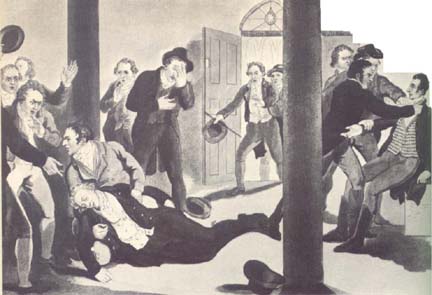A puzzle by Isaac Asimov:
“Name a common English word that contains somewhere in it, at the beginning, end, or middle, the three letters U-F-A in that order.”
I’ll withhold the answer. There’s no trick — it’s an ordinary English word.
A puzzle by Isaac Asimov:
“Name a common English word that contains somewhere in it, at the beginning, end, or middle, the three letters U-F-A in that order.”
I’ll withhold the answer. There’s no trick — it’s an ordinary English word.
If a train remains at the station from two to two to two-two (from 1:58 to 2:02), a passenger who misses it must wait from two-two to two to two.
Tom, while playing a game of Scrabble against Dick, who, while considering the last word that Harry (who had had HAD) had had had had, had had HAD, had had HAD. Had HAD had more letters, he would have played it.
Wouldn’t the sentence “I want to insert a hyphen between the words Fish and And and And and Chips in my Fish And Chips sign” have been clearer if quotation marks had been placed before Fish, and between Fish and and, and and and And, and And and and, and and and And, and And and and, and and and Chips — and after Chips?
Every spring, the town of March in Cambridgeshire holds a “long, flat, pointless walk” across the Fens to Cambridge. “It has no purpose other than to be called the March March march.” There is an associated song, which is sometimes called the “March March March March.”
In March 1893, weary and vexed in his work classifying ancient finger rings, German archaeologist H.V. Hilprecht went to bed and dreamed that a tall priest led him to a Babylonian treasure chamber. The priest explained that the fragments were not finger rings but earrings for a statue of the god Ninib, cut from a votive cylinder sent by King Kirigalzu to the temple of Bel. “If you will put the two together you will have a confirmation of my words,” he said. “But the third ring you have not yet found in the course of your excavations, and you never will find it.”
“With this the priest disappeared,” Hilprecht wrote. “I awoke at once, and immediately told my wife the dream, that I might not forget it. Next morning — Sunday — I examined the fragments once more in the light of these disclosures, and to my astonishment found all the details of the dream precisely verified in so far as the means of verification were in my hands. The original inscription on the votive cylinder read: ‘To the god Ninib, son of Bel, his lord, has Kurigalzu, pontifex of Bel, presented this.'”
(Reported in The American Naturalist, October 1896)
G.K. Chesterton used the term moor eeffocish to describe the queerness sometimes glimpsed in familiar things. He borrowed the phrase from Charles Dickens, who as an unhappy child would sometimes sit in a coffee shop in St. Martin’s Lane:
In the door there was an oval glass plate with ‘COFFEE ROOM’ painted on it, addressed towards the street. If I ever find myself in a very different kind of coffee-room now, but where there is such an inscription on glass, and read it backwards on the wrong side, MOOR EEFFOC (as I often used to do then in a dismal reverie), a shock goes through my blood.
J.R.R. Tolkien later wrote: “The word Mooreeffoc may cause you to realise that England is an utterly alien land, lost either in some remote past age glimpsed by history, or in some strange dim future reached only by a time-machine; to see the amazing oddity and interest of its inhabitants and their customs and feeding-habits.”
A queer exhumation was made in the Strip Vein coal bank of Capt. Lacy, at Hammondsville, Ohio, one day last week. Mr. James Parsons and his two sons were engaged in making the bank, when a huge mass of coal fell down, disclosing a large smooth slate wall, upon the surface of which were found, carved in bold relief, several lines of hieroglyphics. Crowds have visited the place since the discovery and many good scholars have tried to decipher the characters, but all have failed. Nobody has been able to tell in what tongue the words were written. How came the mysterious writing in the bowels of the earth where probably no human eye has ever penetrated? There are several lines about three inches apart, the first line containing twenty-five words. Attempts have been made to remove the slate wall, and bring it out, but upon tapping the wall it gave forth a sound that would seem to indicate the existence of a hollow chamber beyond, and the characters would have been destroyed in removing it. At last accounts Dr. Hartshorn, of Mount Union College, had been sent for to examine the writing.
— Wellsville Union, quoted in The True Latter Day Saints’ Herald, Jan. 1, 1869

Each book in Dante’s Divine Comedy ends with the word stars.
Let the rich, great, and noble banquet in the festal halls,
And pass the hours away, as the most thoughtless revel;
Then seek the poor man’s dreary home, whose very dingy walls
Proclaim full well to all how low his rank and level.
“Take away one letter from a word in the above stanza, and substitute another, leaving the word so metamorphosed still a word of the English language; and, by that change, totally alter the syntactical construction of the whole sentence, changing the moods and tenses of verbs, turning verbs into nouns, nouns into adjectives, and adjectives into adverbs, &c., and so make the entire stanza bear quite a different meaning from that which it has as it stands above.”
Here’s an achievement — in 1936 Buckminster Fuller explained Einstein’s theory of relativity in a telegram:
EINSTEIN’S FORMULA DETERMINATION INDIVIDUAL SPECIFICS RELATIVITY READS QUOTE ENERGY EQUALS MASS TIMES THE SPEED OF LIGHT SQUARED UNQUOTE SPEED OF LIGHT IDENTICAL SPEED ALL RADIATION COSMIC GAMMA X ULTRA VIOLET INFRA RED RAYS ETCETERA ONE HUNDRED EIGHTY SIX THOUSAND MILES PER SECOND WHICH SQUARED IS TOP OR PERFECT SPEED GIVING SCIENCE A FINITE VALUE FOR BASIC FACTOR IN MOTION UNIVERSE STOP SPEED OF RADIANT ENERGY BEING DIRECTIONAL OUTWARD ALL DIRECTIONS EXPANDING WAVE SURFACE DIAMETRIC POLAR SPEED AWAY FROM SELF IS TWICE SPEED IN ONE DIRECTION AND SPEED OF VOLUME INCREASE IS SQUARE OF SPEED IN ONE DIRECTION APPROXIMATELY THIRTY FIVE BILLION VOLUMETRIC MILES PER SECOND STOP FORMULA IS WRITTEN QUOTE LETTER E FOLLOWED CLOSELY BY EQUATION MARK FOLLOWED BY LETTER M FOLLOWED BY LETTER C FOLLOWED CLOSELY BY ELEVATED SMALL FIGURE TWO SYMBOL OF SQUARING UNQUOTE ONLY VARIABLE IN FORMULA IS SPECIFIC MASS SPEED IS A UNIT OF RATE WHICH IS AN INTEGRATED RATIO OF BOTH TIME AND SPACE AND NO GREATER RATE OF SPEED THAN THAT PROVIDED BY ITS CAUSE WHICH IS PURE ENERGY LATENT OR RADIANT IS ATTAINABLE STOP THE FORMULA THEREFORE PROVIDES A UNIT AND A RATE OF PERFECTION TO WHICH THE RELATIVE IMPERFECTION OF INEFFICIENCY OF ENERGY RELEASE IN RADIANT OR CONFINED DIRECTION OF ALL TEMPORAL SPACE PHENOMENA MAY BE COMPARED BY ACTUAL CALCULATION STOP SIGNIFICANCE STOP SPECIFIC QUALITY OF ANIMATES IS CONTROL WILLFUL OR OTHERWISE OF RATE AND DIRECTION ENERGY RELEASE AND APPLICATION NOT ONLY OF SELF MECHANISM BUT OF FROM SELF MACHINE DIVIDED MECHANISMS AND RELATIVITY OF ALL ANIMATES AND INANIMATES IS POTENTIAL OF ESTABLISHMENT THROUGH EINSTEIN FORMULA
The artist Isamu Noguchi was working on a commemorative sculpture in Mexico and had forgotten the precise formula E=mc2. Fuller not only described the formula but explained it — in 264 words.
04/22/2019 UPDATE: In 2009 artist Elisabetta Benassi reproduced the telegram in a carpet.

On the night of May 11, 1812, John Williams of Redruth in Cornwall awakened his wife and told her he’d dreamed that he was in the lobby of the House of Commons and saw a man shoot the chancellor. Twice he went back to sleep, and twice he had the same dream.
Williams repeated the experience to friends in the following days, one of whom told him, “Your description is not at all that of the Chancellor, but is certainly very exactly that of Mr. Perceval, the chancellor of the exchequer.” Williams was explaining that he had never met or corresponded with this man when a messenger arrived from Truro with word that Perceval had been shot by an assassin in the lobby of the House of Commons on May 11 — the night of Williams’ dream.
According to a contemporary news account, Williams visited the spot six weeks later: “Immediately that he came to the steps at the entrance of the lobby, he said, ‘This place is as distinctly within my recollection, in my dream, as any room in my house,’ and he made the same observation when he entered the lobby. He then pointed out the exact spot where Bellingham stood when he fired, and which Mr. Perceval had reached when he was struck by the ball, where, and how he fell. The dress both of Mr. Perceval and Bellingham agreed with the description given by Mr. Williams, even to the most minute particular.”
Mamihlapinatapais, from the Yaghan language of Tierra del Fuego, is considered the world’s most succinct word — and the hardest to translate.
It means “a look shared by two people, each wishing that the other will initiate something that both desire but that neither one wants to start.”